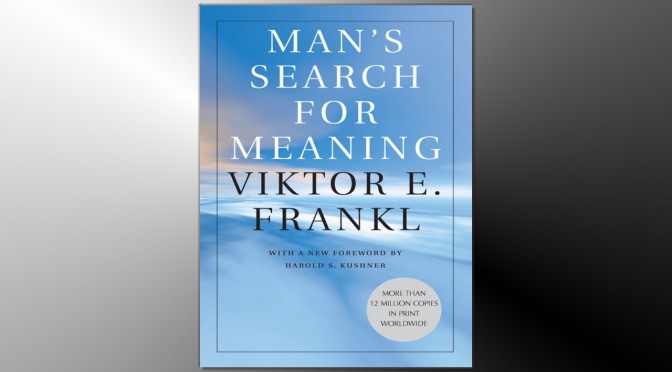“What is to give light must endure burning.” – Viktor Frankl
Viktor Frankl, Austrian psychiatrist and concentration camp survivor, wrote the book in nine days, just a few months after he was freed. The book is divided into two main parts. The first part is about his experience in concentration camps and his interpretation of those experiences as a psychiatrist. The second part is about logotheraphy, a school of psychotherapy he founded partially based on his experience in the concentration camps. The main idea of the book is that the main motivational force in a person’s life is the “will for meaning”. This “will for meaning” is in contrast to the “will for pleasure” in the psychoanalysis of Sigmund Freud, or the “will for power” in the psychology of Alfred Adler.
Frankl states that one can find meaning in one’s life through three ways: (1) by work; (2) by experiencing beauty, truth, art, and nature or by loving someone; and (3) “by the attitude we take toward unavoidable suffering”. In the concentration camps, he kept his will for life by reconstituting his lost manuscript, by imagining giving lectures about lives in concentration camps, and by thinking about his wife and the possibility of seeing her again. His experience and his observation of others in the concentration camps validated the key idea behind logotheraphy. He wrote:
“We who lived in concentration camps can remember the men who walked through the huts comforting others, giving away their last piece of bread. They may have been few in number, but they offer sufficient proof that everything can be taken from a man but one thing: the last of the human freedoms— to choose one’s attitude in any given set of circumstances, to choose one’s own way.”
This idea that one always has the freedom to choose his/her response in a given situation is the reason why Frankl believe everyone is ultimately responsible for his/her own life. To quote again:
“A human being is not one thing among others; things determine each other, but man is ultimately self-determining. What he becomes— within the limits of endowment and environment— he has made out of himself. In the concentration camps, for example, in this living laboratory and on this testing ground, we watched and witnessed some of our comrades behave like swine while others behaved like saints. Man has both potentialities within himself; which one is actualized depends on decisions but not on conditions.”
Just as there are specific music that suits specific moods, there are specific books that suit specific age. This is the book that would a bit too emotionally heavy to read in any early age of my life. Now seems to be a good time to read this book.
Again, some of the amazing quotes from the book:
On humor: “Humor was another of the soul’s weapons in the fight for self-preservation. It is well known that humor, more than anything else in the human make-up, can afford an aloofness and an ability to rise above any situation, even if only for a few seconds.”
On emotion: “Emotion, which is suffering, ceases to be suffering as soon as we form a clear and precise picture of it.”
On curiosity: “Cold curiosity predominated even in Auschwitz, somehow detaching the mind from its surroundings, which came to be regarded with a kind of objectivity. At that time one cultivated this state of mind as a means of protection.”
On duality of human nature: “Life in a concentration camp tore open the human soul and exposed its depths. Is it surprising that in those depths we again found only human qualities which in their very nature were a mixture of good and evil? The rift dividing good from evil, which goes through all human beings, reaches into the lowest depths and becomes apparent even on the bottom of the abyss which is laid open by the concentration camp.”
PS. The idea that one has the freedom to choose his/her response in a given situation is the key idea behind Stephen Covey’s Habit 1 being proactive. To Stephen Covey, a given situation (the stimulus) can encompass not only present environments and conditions, but also past experiences. One can proactively re-scripting oneself according true principles. That is a whole new level of proactivity.
